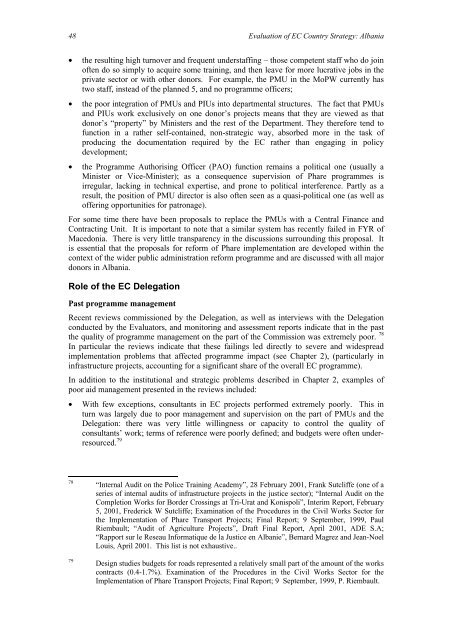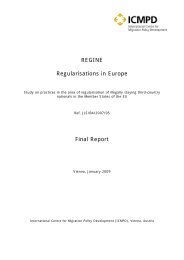Final Report - European Commission - Europa
Final Report - European Commission - Europa
Final Report - European Commission - Europa
You also want an ePaper? Increase the reach of your titles
YUMPU automatically turns print PDFs into web optimized ePapers that Google loves.
48<br />
Evaluation of EC Country Strategy: Albania<br />
• the resulting high turnover and frequent understaffing – those competent staff who do join<br />
often do so simply to acquire some training, and then leave for more lucrative jobs in the<br />
private sector or with other donors. For example, the PMU in the MoPW currently has<br />
two staff, instead of the planned 5, and no programme officers;<br />
• the poor integration of PMUs and PIUs into departmental structures. The fact that PMUs<br />
and PIUs work exclusively on one donor’s projects means that they are viewed as that<br />
donor’s “property” by Ministers and the rest of the Department. They therefore tend to<br />
function in a rather self-contained, non-strategic way, absorbed more in the task of<br />
producing the documentation required by the EC rather than engaging in policy<br />
development;<br />
• the Programme Authorising Officer (PAO) function remains a political one (usually a<br />
Minister or Vice-Minister); as a consequence supervision of Phare programmes is<br />
irregular, lacking in technical expertise, and prone to political interference. Partly as a<br />
result, the position of PMU director is also often seen as a quasi-political one (as well as<br />
offering opportunities for patronage).<br />
For some time there have been proposals to replace the PMUs with a Central Finance and<br />
Contracting Unit. It is important to note that a similar system has recently failed in FYR of<br />
Macedonia. There is very little transparency in the discussions surrounding this proposal. It<br />
is essential that the proposals for reform of Phare implementation are developed within the<br />
context of the wider public administration reform programme and are discussed with all major<br />
donors in Albania.<br />
Role of the EC Delegation<br />
Past programme management<br />
Recent reviews commissioned by the Delegation, as well as interviews with the Delegation<br />
conducted by the Evaluators, and monitoring and assessment reports indicate that in the past<br />
the quality of programme management on the part of the <strong>Commission</strong> was extremely poor. 78<br />
In particular the reviews indicate that these failings led directly to severe and widespread<br />
implementation problems that affected programme impact (see Chapter 2), (particularly in<br />
infrastructure projects, accounting for a significant share of the overall EC programme).<br />
In addition to the institutional and strategic problems described in Chapter 2, examples of<br />
poor aid management presented in the reviews included:<br />
• With few exceptions, consultants in EC projects performed extremely poorly. This in<br />
turn was largely due to poor management and supervision on the part of PMUs and the<br />
Delegation: there was very little willingness or capacity to control the quality of<br />
consultants’ work; terms of reference were poorly defined; and budgets were often underresourced.<br />
79<br />
78<br />
79<br />
“Internal Audit on the Police Training Academy”, 28 February 2001, Frank Sutcliffe (one of a<br />
series of internal audits of infrastructure projects in the justice sector); “Internal Audit on the<br />
Completion Works for Border Crossings at Tri-Urat and Konispoli”, Interim <strong>Report</strong>, February<br />
5, 2001, Frederick W Sutcliffe; Examination of the Procedures in the Civil Works Sector for<br />
the Implementation of Phare Transport Projects; <strong>Final</strong> <strong>Report</strong>; 9 September, 1999, Paul<br />
Riembault; “Audit of Agriculture Projects”, Draft <strong>Final</strong> <strong>Report</strong>, April 2001, ADE S.A;<br />
“Rapport sur le Reseau Informatique de la Justice en Albanie”, Bernard Magrez and Jean-Noel<br />
Louis, April 2001. This list is not exhaustive..<br />
Design studies budgets for roads represented a relatively small part of the amount of the works<br />
contracts (0.4-1.7%). Examination of the Procedures in the Civil Works Sector for the<br />
Implementation of Phare Transport Projects; <strong>Final</strong> <strong>Report</strong>; 9 September, 1999, P. Riembault.
















